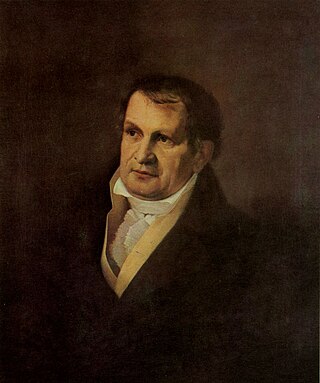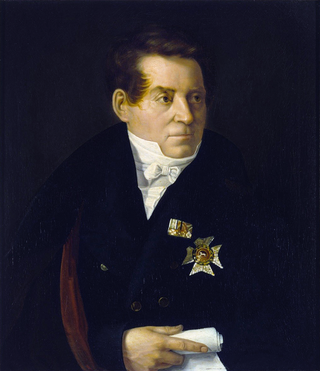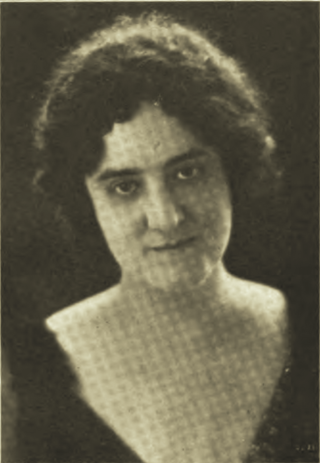Related Research Articles
"Bruces' Philosophers Song", also known as "The Bruces' Song", is a Monty Python song written and composed by Eric Idle that was a feature of the group's stage appearances and its recordings.

Friedrich Wilhelm Christian Karl Ferdinand von Humboldt was a German philosopher, linguist, government functionary, diplomat, and founder of the Humboldt University of Berlin, which was named after him in 1949.

Johann Ludwig Tieck was a German poet, fiction writer, translator, and critic. He was one of the founding fathers of the Romantic movement in the late 18th and early 19th centuries.

German Romanticism was the dominant intellectual movement of German-speaking countries in the late 18th and early 19th centuries, influencing philosophy, aesthetics, literature, and criticism. Compared to English Romanticism, the German variety developed relatively early, and, in the opening years, coincided with Weimar Classicism (1772–1805).

Friedrich Wilhelm Joseph Schelling, later von Schelling, was a German philosopher. Standard histories of philosophy make him the midpoint in the development of German idealism, situating him between Johann Gottlieb Fichte, his mentor in his early years, and Georg Wilhelm Friedrich Hegel, his one-time university roommate, early friend, and later rival. Interpreting Schelling's philosophy is regarded as difficult because of its evolving nature.

August WilhelmSchlegel, usually cited as August Schlegel, was a German Indologist, poet, translator and critic, and with his brother Friedrich Schlegel the leading influence within Jena Romanticism. His translations of Shakespeare turned the English dramatist's works into German classics. Schlegel was also the professor of Sanskrit in Continental Europe and produced a translation of the Bhagavad Gita.

Karl Wilhelm FriedrichSchlegel was a German poet, literary critic, philosopher, philologist, and Indologist. With his older brother, August Wilhelm Schlegel, he was one of the main figures of Jena Romanticism.

Georg Philipp Friedrich Freiherr von Hardenberg, pen name Novalis, was a German aristocrat and polymath, who was a poet, novelist, philosopher and mystic. He is regarded as an influential figure of Jena Romanticism.
Plastic arts are art forms which involve physical manipulation of a plastic medium, such as clay, wax, paint – or even plastic in the modern sense of the word – to create works of art. The term is used more generally to refer to the visual arts, rather than literature and music. Materials for use in the plastic arts, in the narrower definition, include those that can be carved or shaped, such as stone or wood, concrete, glass, or metal.

Karl Christian Friedrich Krause was a German philosopher whose doctrines became known as Krausism. Krausism, when considered in its totality as a complete, stand-alone philosophical system, had only a small following in Germany, France, and Belgium, in contradistinction to certain other philosophical systems that had a much larger following in Europe at that time. However, Krausism became very popular and influential in Restoration Spain not as a complete, comprehensive philosophical system per se, but as a broad cultural movement. In Spain, Krausism was known as "Krausismo", and Krausists were known as "Krausistas". Outside of Spain, the Spanish Krausist cultural movement was referred to as Spanish Krausism.
Schlegel is a German occupational surname. Notable people with the surname include:

Hermann Schlegel was a German ornithologist, herpetologist and ichthyologist.

Ernst August Friedrich Klingemann was a German writer. He is generally agreed to be the author of the 1804 novel Nachtwachen (Nightwatches) under the pseudonym Bonaventura.

Johann Michael Raich was a Catholic theologian.
The Athenaeum was a literary magazine established in 1798 by August Wilhelm and Karl Wilhelm Friedrich Schlegel. It is considered to be the founding publication of German Romanticism. Only three volumes were published, in 1798, 1799, and 1800.
Jena Romanticism is the first phase of Romanticism in German literature represented by the work of a group centred in Jena from about 1798 to 1804. The movement is considered to have contributed to the development of German idealism in late modern philosophy.
Andrew S. Bowie is Professor of Philosophy and German at Royal Holloway, University of London and Founding Director of the Humanities and Arts Research Centre (HARC).

Anna Augusta Von Helmholtz-Phelan was an American university professor, author, speaker, poet and social worker. For more than four decades, she taught English and writing at the University of Minnesota, with a specialty in short stories, before retiring in 1949 as assistant professor emeritus of English. Phelan was the author of The Indebtedness of Samuel Taylor Coleridge to August Wilhelm Von Schlegel, The Social Ideals of William Morris (1908), The Staging of the Court Drama to 1595 (1909), and The Social Philosophy of William Morris (1927). A collection of her poetry was published in The Crystal Cup (1949), the proceeds of which established the "Anna Augusta Von Helmholtz-Phelan Award for Creative Writing" at the University of Minnesota.